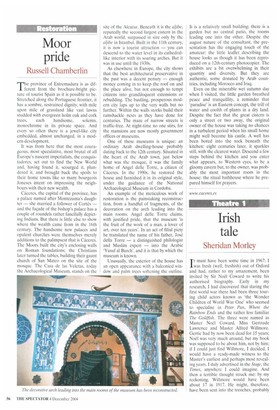Irish tale
Sheridan Morley
I t must have been some time in 1967: I was fresh (well, freshish) out of Oxford and had, rather to my amazement, been invited by Sir Noel Coward to write his authorised biography. Early in my research, I had discovered that during the first world war there had been three touring child actors known as `the Wonder Children of World War One' who seemed to specialise in Peter Pan, Where the Rainbow Ends and the rather less familiar The Goldfish. The three were named as Master Noel Coward, Miss Gertrude Lawrence and Master Alfred Willmore. Gertie had by now been dead for 15 years; Noel was very much around, but my book was supposed to be about him, not by him; if I could just find Willmore, I decided, I would have a ready-made witness to the Master's earliest and perhaps most revealing years. I duly advertised in the Stage, the Times, anywhere I could imagine. And then a terrible thought struck me: by my reckoning, Willmore would have been about 17 in 1917. He might, therefore, have been sent into the trenches, probably never to return. I duly and reluctantly gave up the search: even Noel had lost all track of him.
This is where you start to believe in a God of Biographers: several months later, I was sent by my then employers, BBC2's Late Night Line Up, to film a 'Special' on the arts in Dublin. We stayed, of course, in the Harcourt Terrace home of Micheal MacLiammoir and Hilton Edwards. We were not then allowed to say that they were lovers, but it can't have escaped many viewers' notice that at 10 a.m. Micheal was in full stage make-up plus a bizarre hairpiece which seemed to move of its own volition, while Hilton, though decidedly more butch, also tended to be away with the fairies.
But no programme about the arts in Dublin would then have been complete without them: though Hilton retained a faint cockney accent, Micheal was as Irish as, well, as Harry Lauder was Scots. He exuded lrishness to an almost caricature degree, was even then touring the world in his defining Oscar Wilde solo, and seemed to have distant family connections with Yeats or Synge or possibly both. You could not, in short, have imagined or conjured up anyone more Irish: even the curious spelling of 'Micheal' suggested an archetypal, quintessential Irishness, so I decided to start my programme with him: 'Whereabouts in Ireland, Mr MacLiammoir, were you born?' I inquired, expecting his usual routine about Yeats and the magic of the Irish followed by the rather more dubious though oft-told tale of his spotting the young, gorgeous Orson Welles straight off the boat from America (although on reflection that, too, may have been a closet-gay encounter).
But this particular Dublin morning, for reasons I shall never understand, 'Micheal' had decided to tell his interviewer the truth. 'I was never Irish,' he said simply. was Alfred Willmore.'
I'm told that off camera, on the soundtrack, you could hear the sound of me choking. I had found, purely by accident, my prime witness to Noel as a teenager, but what of Alfred/Micheal? Why the total switch of identity, until that moment arguably the most successful ever achieved by a public figure in Britain? I should have guessed the answer: shortly after Alfred/Michears touring days with Noel and Gertie, he had run into a little homosexual trouble with the London police, and decided that Dublin might be altogether more liberal in its tolerance of homosexuality. When, however, Harcourt Terrace (where he had set up home with his beloved Hilton Edwards) proved a little too gay for even the Dublin police, the boys escaped all conviction by putting their old landlady up as a witness: 'Gentlemen of total sexual propriety,' she averred. `In all the months they have been lodging with me, I never have seen a woman going up their stairs.'
I saw Micheal twice more: once when my father Robert put together a Festival of One-Man Shows to raise funds for the Theatre Royal Windsor, and MacLiammetir again gave us his Oscar, the most mesmeric solo show I have ever seen in 40 years of theatregoing; and once when I took him backstage at one of Coward's last first nights. `And have you,' I asked the Master, 'ever met Alfred Willmore?' It was, I think, the only time that I managed to render Noel totally silent. As theatrical conjuring tricks go, MacLiammOirWillmore's has to be the best. No wonder he was always so fascinated by the doppelganger plot of The Importance of Being Earnest, and by Wilde's offstage belief that you could always reinvent yourself as someone entirely different if the law turned ugly.
Gates of Gold by Frank McGuinness, which received its British premiere at the Finborough Theatre and runs there until 18 December, was inspired by the story of Micheal MacLiammoir and Hilton Edwards. Sheridan Morley is drama critic of the Daily Express: his Noel and Gertie is published by Oberon Books and his memoirs, Asking for Trouble, are newly published in paperback by Sceptre.



















































































 Previous page
Previous page